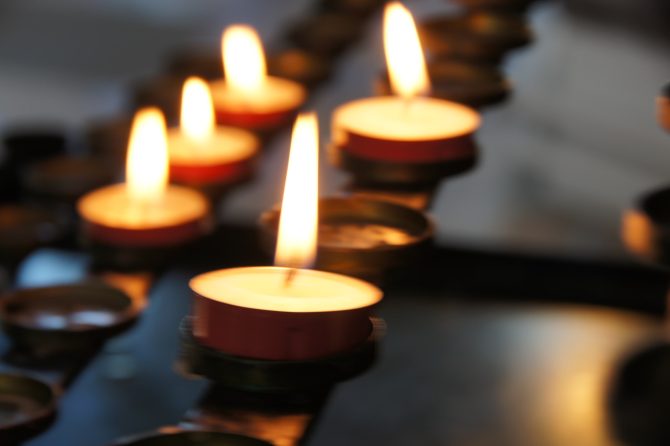Alternative Funeral Options: Are They Right for Me?
Date posted February 2023
A traditional funeral service may not be suitable for everyone, for a variety of reasons. When thinking ahead to the kind of send-off you would prefer, or when planning for a loved one, it is important to consider the type of funeral that best celebrates the life lost.

This post looks at the alternative funeral options available and offers some advice to help you decide if a non-traditional service or celebration might be the right choice.
What is an alternative funeral?
An alternative funeral is simply one that is non-traditional in its setting or content. A non-traditional funeral can offer a more positive and joyous send-off, compared to a traditional service at a church, crematorium or burial ground, which some may find too sombre and austere.
Why would someone opt for an alternative funeral?
There are several reasons why a person might prefer an alternative funeral. For example, if the deceased did not hold religious beliefs in their lifetime, they might not want a funeral with religious overtones. Other reasons for choosing a non-traditional funeral include a person who had connections to maritime life preferring a burial at sea. Similarly, someone with a lifelong passion might want that reflected in their send-off by way of a themed funeral.
What are the main alternative funeral options?
Many different types of funerals can be described as “alternative”. Here are the main alternative funeral options you might like to consider:
Natural funeral
Natural or environmentally friendly funerals are increasingly popular. These types of funerals are held at a designated natural burial ground or woodland burial site. There are several such sites across the UK, where mourners can gather and celebrate the life of their loved one in a tranquil natural environment. There are quite strict requirements for holding a natural burial. These include that the body is not embalmed and that a coffin made from a biodegradable material, such as willow or bamboo, is used.
Humanist or civic funeral
These types of ceremony more closely resemble a traditional funeral. The main difference is the level of religious content included. A humanist funeral generally does not include any religious content. Instead, poems and music that have meaning to the deceased can be shared. Meanwhile, a civic or civil funeral can feature more religious content, making this type of service a preferred option for anyone who wishes to combine elements of a traditional and alternative funeral. For example, they can include a favourite hymn or prayer alongside non-religious content. These funerals are led by a humanist or civil celebrant, who can help to design a bespoke service.
Celebration of life ceremony
A celebration of life ceremony offers friends and family the opportunity to say goodbye in a way that is more upbeat and less structured than a traditional funeral. The ceremony is informal and can even resemble a party, where those left behind are encouraged to celebrate life rather than mourn a passing. While a celebration of life ceremony offers an alternative to a traditional funeral, it can also be held following the formal service or an unattended cremation, which is discussed below.
Themed funeral
These types of alternative funeral are personal yet retain the features of a traditional ceremony. They can be as low-key or as extravagant as you would like, as long as they adhere to any relevant rules. A themed funeral may be as simple as a bespoke coffin or unique hearse, or a request for attendees to dress in a certain way. Themed funerals are usually designed around a favourite hobby, film or TV show or a special passion the deceased enjoyed. Given their unique and quirky nature, a themed funeral can be a fun and personal occasion, which can be a fitting way to say goodbye to a loved one who embraced life.
Burial at sea
While traditionally only available to those who served with the Royal Navy, a burial at sea is now open to civilians. However, there are only three sites in the country where a burial at sea is permitted and a licence is needed from the government. The cost of a true burial at sea can be steep (up to around £4,500), due to the specially equipped boat needed and other requirements which must be fulfilled by law. A more cost-effective way to celebrate a sea-lover’s life is to scatter their ashes at sea following a cremation, which does not require a permit.
Unattended cremation
An unattended cremation is the simplest and most basic type of funeral. It is suitable for anyone on a budget or for those who just prefer not to have a formal funeral service. With this type of funeral, there is no service and only close family may attend the cremation. Mourners might choose to hold a separate memorial service following the cremation, such as the celebration of life ceremony discussed above.
What else should I know about planning an alternative funeral?
Whether you’re planning your own non-traditional funeral or arranging a service for a loved one who passed away without leaving instructions, it is a good idea to discuss your arrangements with close friends and family.
Some guests might automatically assume they will be attending a traditional (religious) funeral to mourn. So, if this is not the case, it is worth giving them notice that alternative arrangements have been made.
Whatever type of funeral you would like for yourself, make sure you put your wishes in writing, so those left behind can ensure your life is celebrated in your chosen way. You can include your plans in your final will or fill in a separate Funeral Wishes form.
Finally, it is always recommended to discuss your wishes with a professional funeral planning service to ensure they can be carried out legally and within the available budget.
Speak to a professional funeral director
If you are considering an alternative funeral or would simply like to discuss your options, Bristol funeral directors F Woodruff can help. Contact us for expert advice on any aspect of planning a bespoke funeral service. Our friendly, knowledgeable and compassionate team will be happy to answer any questions you may have.


